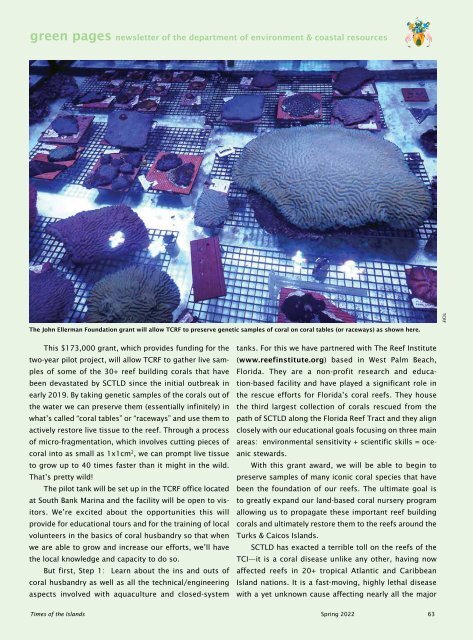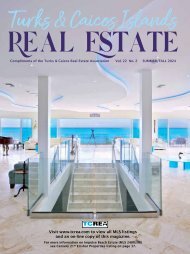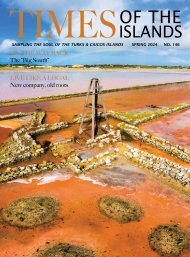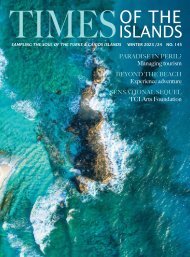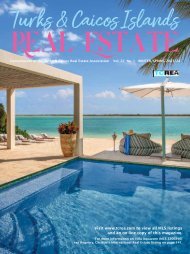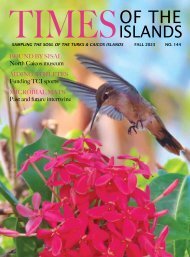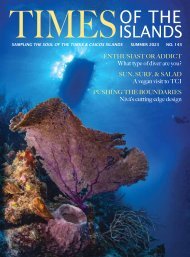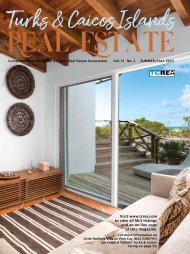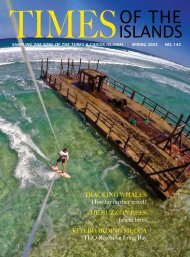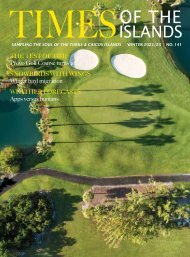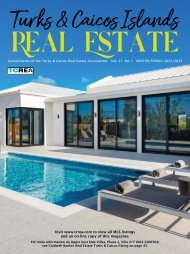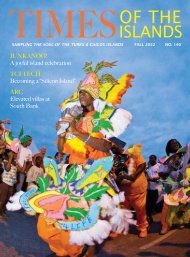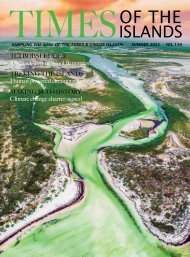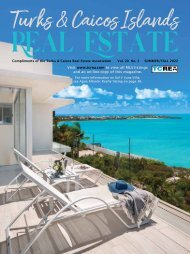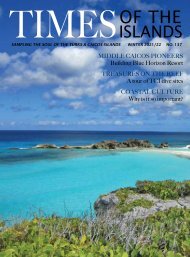Times of the Islands Spring 2022
Presents the "soul of the Turks & Caicos Islands" with in-depth features about local people, culture, history, environment, real estate, businesses, resorts, restaurants and activities.
Presents the "soul of the Turks & Caicos Islands" with in-depth features about local people, culture, history, environment, real estate, businesses, resorts, restaurants and activities.
Create successful ePaper yourself
Turn your PDF publications into a flip-book with our unique Google optimized e-Paper software.
green pages newsletter <strong>of</strong> <strong>the</strong> department <strong>of</strong> environment & coastal resources<br />
TCRF<br />
The John Ellerman Foundation grant will allow TCRF to preserve genetic samples <strong>of</strong> coral on coral tables (or raceways) as shown here.<br />
This $173,000 grant, which provides funding for <strong>the</strong><br />
two-year pilot project, will allow TCRF to ga<strong>the</strong>r live samples<br />
<strong>of</strong> some <strong>of</strong> <strong>the</strong> 30+ reef building corals that have<br />
been devastated by SCTLD since <strong>the</strong> initial outbreak in<br />
early 2019. By taking genetic samples <strong>of</strong> <strong>the</strong> corals out <strong>of</strong><br />
<strong>the</strong> water we can preserve <strong>the</strong>m (essentially infinitely) in<br />
what’s called “coral tables” or “raceways” and use <strong>the</strong>m to<br />
actively restore live tissue to <strong>the</strong> reef. Through a process<br />
<strong>of</strong> micro-fragmentation, which involves cutting pieces <strong>of</strong><br />
coral into as small as 1x1cm 2 , we can prompt live tissue<br />
to grow up to 40 times faster than it might in <strong>the</strong> wild.<br />
That’s pretty wild!<br />
The pilot tank will be set up in <strong>the</strong> TCRF <strong>of</strong>fice located<br />
at South Bank Marina and <strong>the</strong> facility will be open to visitors.<br />
We’re excited about <strong>the</strong> opportunities this will<br />
provide for educational tours and for <strong>the</strong> training <strong>of</strong> local<br />
volunteers in <strong>the</strong> basics <strong>of</strong> coral husbandry so that when<br />
we are able to grow and increase our efforts, we’ll have<br />
<strong>the</strong> local knowledge and capacity to do so.<br />
But first, Step 1: Learn about <strong>the</strong> ins and outs <strong>of</strong><br />
coral husbandry as well as all <strong>the</strong> technical/engineering<br />
aspects involved with aquaculture and closed-system<br />
tanks. For this we have partnered with The Reef Institute<br />
(www.reefinstitute.org) based in West Palm Beach,<br />
Florida. They are a non-pr<strong>of</strong>it research and education-based<br />
facility and have played a significant role in<br />
<strong>the</strong> rescue efforts for Florida’s coral reefs. They house<br />
<strong>the</strong> third largest collection <strong>of</strong> corals rescued from <strong>the</strong><br />
path <strong>of</strong> SCTLD along <strong>the</strong> Florida Reef Tract and <strong>the</strong>y align<br />
closely with our educational goals focusing on three main<br />
areas: environmental sensitivity + scientific skills = oceanic<br />
stewards.<br />
With this grant award, we will be able to begin to<br />
preserve samples <strong>of</strong> many iconic coral species that have<br />
been <strong>the</strong> foundation <strong>of</strong> our reefs. The ultimate goal is<br />
to greatly expand our land-based coral nursery program<br />
allowing us to propagate <strong>the</strong>se important reef building<br />
corals and ultimately restore <strong>the</strong>m to <strong>the</strong> reefs around <strong>the</strong><br />
Turks & Caicos <strong>Islands</strong>.<br />
SCTLD has exacted a terrible toll on <strong>the</strong> reefs <strong>of</strong> <strong>the</strong><br />
TCI—it is a coral disease unlike any o<strong>the</strong>r, having now<br />
affected reefs in 20+ tropical Atlantic and Caribbean<br />
Island nations. It is a fast-moving, highly lethal disease<br />
with a yet unknown cause affecting nearly all <strong>the</strong> major<br />
<strong>Times</strong> <strong>of</strong> <strong>the</strong> <strong>Islands</strong> <strong>Spring</strong> <strong>2022</strong> 63


